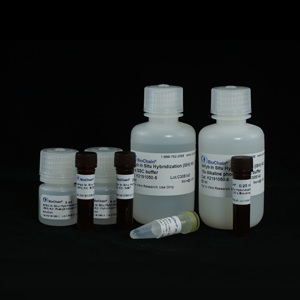- Need assistance?
- 1-888-762-2568
- Contact Us
IsHyb In Situ Hybridization (ISH) Kit for 50 slides
- Applications: Assay
Need help with your order?
Find out more about placing an order here or contact us for technical support.Product Description
Product Specifications
| Features | Specifications |
|---|---|
| Size | 1 kit |
| Shipping | Blue Ice |
| Sex | Contact Us |
| Age At Sampling | Contact Us |
| Applications | Assay |
| Sample Type | Tissue |
Protocols
Flyers & Brochures
SDS
Certificate of Analysis
Applications:
• Clinical diagnostics and decision-making
• Gene mutation studies
• Localized gene expression studies
Advantages and Features:
• Useful for microRNA detection
• Non-isotopic, colorimetric detection of gene expression
• RNase-free, ISH-optimized reagents
• Can be used with either oligonucleotide or ribonucleotide probes
• All lots are tested by ISH using QC-tested probes on known tissues
• Fully optimized protocol
• Can be used on tissue section and/or tissue microarray slides
• Expert technical support is available
More Information About In Situ Hybridization (ISH)
In situ hybridization (ISH) continues to be a powerful research and diagnostic tool, since it enables researchers and clinicians to study gene expression in individual cells within intact tissue sections. This allows the cells to remain in as natural a state as possible, allowing for more useful gene expression data to be generated for each cell. In situ hybridization complements immunohistochemistry, which more directly measures protein expression in specific cells within a tissue sample. Additionally, immunohistochemistry depends of the availability of high quality antibodies that can specifically detect proteins of interest, which may not be available. In these cases the gene expression data generated by in situ hybridization becomes even more important.
In situ hybridization is a well-studied technique, with many published protocols and reagent recipes. In spite of this, there are advantages to purchasing ready-made kits, which include the needed reagents that have been pre-made and subjected to formal quality control practices. A reagent kit, with an optimized protocol and consistently produced components can save both time and money, while providing better datasets. Biochain’s in situ hybridization kit is designed for digoxygenin-labeled probes and alkaline phosphatase detection, eliminating the need for radioactive DNA labeling. The kit includes the pre-hybridization and hybridization solutions, NBT and BCIP detection reagents, blocking solution, SSC buffer, alkaline phosphatase buffer, and an anti-Dig antibody. The in situ hybridization kit does not include reagents and enzymes for labeling probes. Any Dig labeled detection probe can be used. BioChain’s in situ hybridization kit has protocols for both frozen and formalin fixed paraffin embedded (FFPE) tissues and cells.


